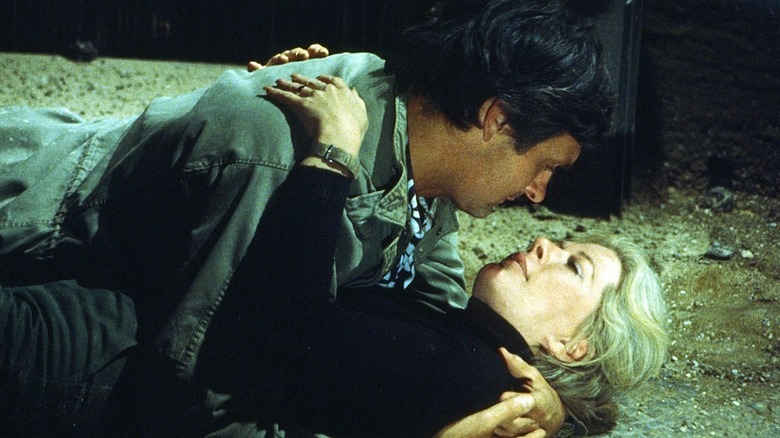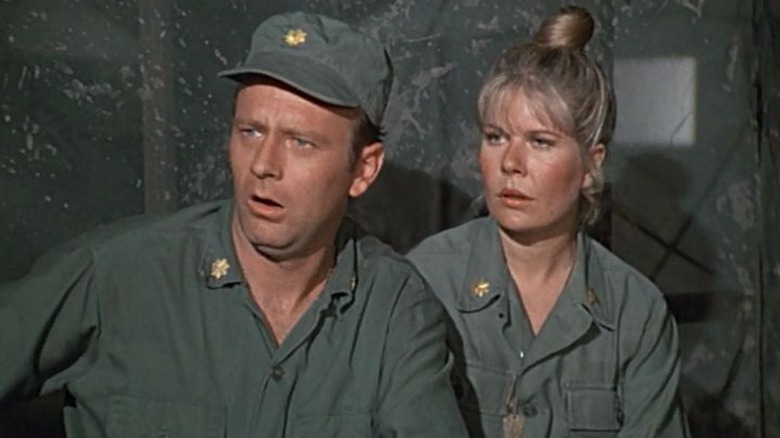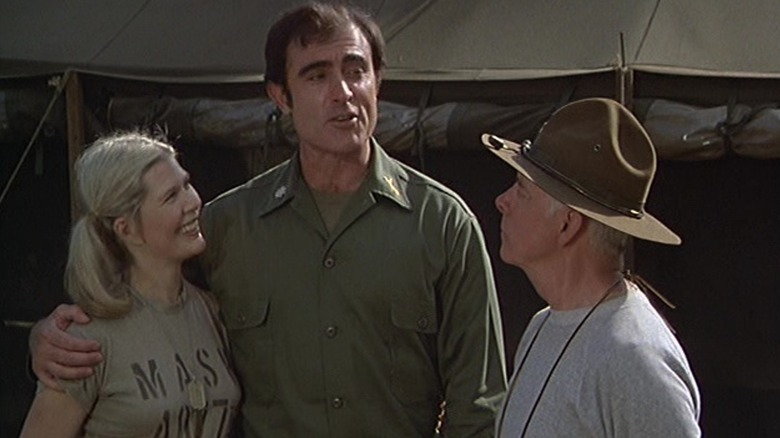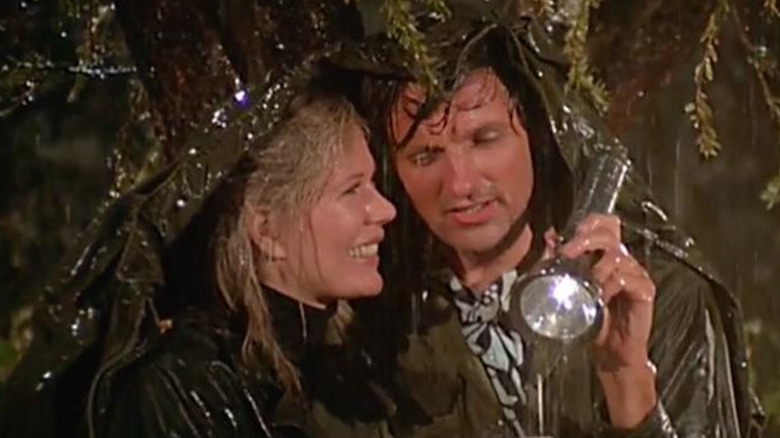Why A Pivotal M*A*S*H Episode Was Kept On The Backburner For Years
The groundbreaking television sitcom version of "M*A*S*H" may have been centered on the Korean War, but it famously ran for 11 years, over three times as long as the war. Like a lot of series, the length of its run led to significant tonal shifts as writers and actors left the show and new creatives came on. In particular, "M*A*S*H" went from an acidic, satirical portrait of military cynicism at a mobile surgical unit (the 4077th) to a much more earnestly anti-war show.
You can trace a lot of those changes in the ways the series' characters changed and developed. In the first half of the show, most of the folk who work at the 4077th are either bureaucratic blowhards like Majors Frank Burns (Larry Linville) and Margaret "Hot Lips" Houlihan (Loretta Swit) or nihilistic, hedonist heroes like "Hawkeye" Pierce (Alan Alda). Surrounded by war and death, the characters had extremes to lean into, for either comedic or dramatic effect. Bit by bit, though, things changed. Characters were switched out, their replacements were a little warmer, and the tone of the show gradually softened.
Still, the biggest change the show ran into came during its sixth season, as part of a two-part episode called "Comrades in Arms." Margaret and Hawkeye were natural enemies for much of the show up to that point; the self-serious military nurse versus the relaxed, martini-swilling surgeon. By that season, the show had found the cast members it would keep until the very end, and the antagonism between Hawkeye and Margaret was beginning to look like a relic from the early days. The best means of resolving it was a simple one: have them sleep with each other, using a script Alda had written years earlier.
Margaret became less of a stereotype
When "M*A*S*H" kicked off, Margaret, along with her lover Frank, was the authority in the 4077th. Never mind the fact that Colonel Henry Blake (McLean Stevenson, who memorably left the show after the third season) was the official man in charge. Frank and Margaret curbed the fun of Hawkeye and deferred to the higher-ups, with no original thought in their head. Even their love scenes felt ripped from soap operas.
The trick with "M*A*S*H" is that even in the early, more anarchic seasons, the show was willing to get serious. Most importantly, the obligatory laugh track that the show featured was removed in the scenes of surgical operation, which meant that the danger of the war could be taken seriously. Within that, the characters took the profession seriously, which meant they took each other seriously. Between surgeries, they might have played pranks or slept around or fought at the mess hall, but their collective efforts to keep people alive brought them together, if only for a couple of scenes an episode.
Frank and Margaret's relationship was sturdy through most of the first couple of seasons of the show. The status quo kept them together even as the show changed. Frank's cartoonishly hypocritical and pathetic demeanor felt increasingly at odds with the more nuanced tone the show was developing, and series creator Larry Gelbart would even go on to regret the "lazy writing" he associated with Frank. When the two broke up in the show's fifth season, it became a natural way to move the series beyond Frank and to develop Margaret into a more compelling, and less antagonistic, character.
When Margaret got married
Margaret and Frank's breakup was, and came out of, a major plot development, for "M*A*S*H." The show's relationship with continuity was always pretty loose, but it was willing to occasionally deal with major developments that shook the show's foundation. While Frank's loveless marriage back home had set the stage for his affair with Margaret in the camp, Margaret was single until the show's fifth season. She meets Lt. Colonel Penobscott (Beeson Carroll in one episode, Mike Henry in others), who asks her to marry him, but "M*A*S*H" was never a show that was especially concerned with marital fidelity. Still, it was always willing to slip innuendos past the censors.
Penobscott stays out of the show for the most part as Margaret's offscreen, and deeply unfaithful, husband. When he does show up, it's usually in the form of a telegram or a letter. In the season 6 two-part episode "Comrades In Arms," written by Alda, Margaret gets a letter from him that causes her great distress, and it's just before she and Hawkeye are sent out on assignment to another camp, the 8063rd. Hawkeye's zany humor mixed with Margaret's emotional pain leads to a funny round of tension, which only gets worse when they discover the 8063rd has been abandoned.
Antics follow as the two seek shelter effectively behind enemy lines, ultimately culminating in them taking refuge in a shack. The circumstances bond them as Margaret explains that her husband's letter was meant for another woman, and it described Margaret herself as "sturdy," which was probably a greater insult than anything Hawkeye had done to her over six seasons. As bombs fall through the night, the two get closer, ultimately embracing each other in a kiss before the credits roll.
The two-parter that changed M*A*S*H
As Swit once recalled to Yahoo Entertainment, the script for "Comrades In Arms" had been on the backburner for some time. Alda had penned numerous scripts for the show over its run, but this particular one was met with hesitation by the show's creators. Much of that had to do with the familiar antagonism between the characters and the fact that, like many sitcoms, "M*A*S*H" had a duty to return to the status quo. As Swift put it, "The creators weren't sure the audience would accept it."
By the show's sixth season, however, enough things about the show had changed to where the brief affair could comfortably fit in the new dynamics. Even though the episode begins with familiar tension between the characters, with Margaret accusing Hawkeye of treating the nurses like a "harem," it ends with them hooking up. And it was up to the second part of the episode, also written by Alda, to make sure their afterglow was handled appropriately.
In a fashion typical of "M*A*S*H," it's a perfect storm of farce and drama as Margaret is suddenly smitten with the rakish Hawkeye, and the two still struggle to get back to the camp. He's less than interested in a long-term relationship, which causes difficulties when they need to perform surgery together later on. Still, they end the episode with a new understanding and a new friendship.
Ultimately, as Swit recalled, while it didn't fundamentally adjust the setup of the show, it led to a more subtle change for the characters. The famous kiss that they shared in the finale, "the longest kiss in television history" per Swit and one of many memorable Margaret moments in the episode, wouldn't have been possible without it.



